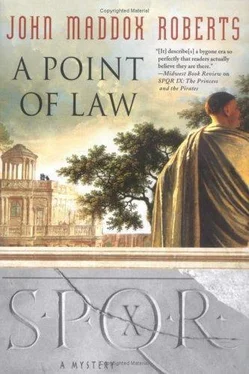John Roberts - A Point of Law
Здесь есть возможность читать онлайн «John Roberts - A Point of Law» весь текст электронной книги совершенно бесплатно (целиком полную версию без сокращений). В некоторых случаях можно слушать аудио, скачать через торрент в формате fb2 и присутствует краткое содержание. Год выпуска: 0101, ISBN: 0101, Издательство: St. Martin, Жанр: Исторический детектив, на английском языке. Описание произведения, (предисловие) а так же отзывы посетителей доступны на портале библиотеки ЛибКат.
- Название:A Point of Law
- Автор:
- Издательство:St. Martin
- Жанр:
- Год:0101
- ISBN:9780312337254
- Рейтинг книги:5 / 5. Голосов: 1
-
Избранное:Добавить в избранное
- Отзывы:
-
Ваша оценка:
- 100
- 1
- 2
- 3
- 4
- 5
A Point of Law: краткое содержание, описание и аннотация
Предлагаем к чтению аннотацию, описание, краткое содержание или предисловие (зависит от того, что написал сам автор книги «A Point of Law»). Если вы не нашли необходимую информацию о книге — напишите в комментариях, мы постараемся отыскать её.
A Point of Law — читать онлайн бесплатно полную книгу (весь текст) целиком
Ниже представлен текст книги, разбитый по страницам. Система сохранения места последней прочитанной страницы, позволяет с удобством читать онлайн бесплатно книгу «A Point of Law», без необходимости каждый раз заново искать на чём Вы остановились. Поставьте закладку, и сможете в любой момент перейти на страницу, на которой закончили чтение.
Интервал:
Закладка:
“We’ve sorted these into what seem to be chronological order,” Callista said crisply. She took a sheet from Julia. “This one I’ve put first because the original showed signs of awkwardness in using the cipher. The ones I’ve assigned a later date show far greater assurance in the execution.”
“That makes sense,” I allowed. I took the sheet and read. It began without the usual preamble: “From so-and-so to his esteemed friend so-and-so, greeting.” Instead, it got down to business in the first line.
Our supporters are in place and have their orders. They will assist you in any way you wish, as in locating and inviting the subjects for each of your meetings, accompanying you to the Forum, etc. From receipt of this message you are not to approach us in public or in private. If you encounter one of us in a public place, there can be no more than an exchange of civilities. In public, for now, we are mere acquaintances whose families are vaguely connected. For your first gathering you will invite the following men whose sympathies we deem to be in accord with our program:
There followed a list of seven names. Those I recognized were low-level senators, two of them relatively well-known malcontents who continualy courted attention by berating the greatest men. They were tolerated because of tradition and because we liked to let the public think that the Senate is an assembly of equals, as in the good old days. When the plebs saw nonentities like these haranguing Caesar or Pompey, Cato or Cicero, to his face, right up on the Rostra, it gave everyone a sense of participation and the comforting and very deceptive feeling that Rome was in no danger of succumbing to tyranny.
“The next few,” Callista said, “are very brief and mostly list the guests he is to invite to each new meeting.” She showed me these and each of them gave a list of seven names, along with assurances that all was proceeding splendidly.
“Always seven names,” I muttered.
“What was that?” Julia queried.
“Wait awhile,” I said, studying the lists. “Things are beginning to shape up.”
“I love it when he’s like this,” Julia said.
“He is communicating with his muse,” Callista affirmed.
I ordinarily resent it when people talk about me as if I were not present, but this time I was too preoccupied to take umbrage. As the messages progressed according to Callista’s chronological table, the names of the senators and others got less safe. More prominent men began to show up, men known to have reservations about the trend of Roman politics, but not radical. Some names began to be repeated. These must have been the ones inclined to fall in with Fulvius’s crackpot scheme. I mentioned this to the two women.
“That makes sense,” Callista commented.
“The equites ,” I said, “at least those whose names I recognize, are not in the banking or moneylending fraternity. Most seem to be members of prominent business families. These are probably men who have squandered their wealth and are in danger of being degraded from equestrian status.”
“I notice,” said Julia, “that while some of these names are prominantly anti-Pompey or anti-Caesar, none are famously pro-Pompey or pro-Caesar.”
“Very astute, my dear. No, these are mostly malcontents, those perpetually jealous of the great men but adhering to none of them. You may also notice that none of Cato’s patriotic little band are here either. And this despite the fact that Fulvius’s walls were decorated with their favorite historical patriots.”
Julia thought about that for a moment. “Those men are veritable ancestor worshippers, but they are also against any sort of tyrant.”
I put down the papers for a moment and gestured to a nearby slave, who refilled my rhyton. I no longer even noticed the resinous taste. My mind was working like one of those German ale vats, where little clumps of spirit-inspired particles swarm around like bees.
“Do you recall what I told you about the wardrobe Hermes and I found in Fulvius’s house?” I looked around. “By the way, where is Hermes? I haven’t seen him all afternoon.”
“He said he had to go locate some people, and he’d catch up to you later. As I recall you found some equestrian tunics, some senatorial tunics, a plain, white toga, and a toga praetexta .”
“Very good. At the time this told me that the man had vaunting, presumptuous ambitions. He was ready to assume a seat in the Senate and curule office. What escaped me at the time was what was not there.”
“This being?” Julia queried.
“He had no toga candida and no toga trabea.” I caught Callista’s quizzical look and elucidated. “The candida is the specially whitened toga we wear when standing for office. The trabea is a striped robe worn by augurs and some orders of priesthood.”
“He could have had the plain toga whitened,” Julia said.
“That would have left him with no toga for everyday purposes: Senate meetings and sacrifices and such.” More and more in those days, Roman men were discarding the toga except for formal occasions.
“So what do you deduce from this?” Callista wanted to know.
“First of all, that he expected to get a Senate seat, and even curule office, without standing for election.”
“Only a dictator can place a man in the Senate without election. At the very least it takes a vote of the full Senate.”
“Exactly.”
“Why not a priestly robe?” Callista asked.
“Most colleges of priesthood are filled by co-option. A priesthood is held for life. On the death of, say, an augur, the College of Augurs meets and votes in a new member. Likewise with most other priesthoods. A flamen can be appointed by a dictator, but they have to be patricians, and Fulvius didn’t qualify. Certain positions, such as Pontifex Maximus , are elective. But once elected, the pontificate is for life. The men behind Marcus Fulvius promised him a Senate seat and a curule office without having to stand for election. They couldn’t make him an augur or a pontifex, so they didn’t bother making the offer.”
“So somebody intended to become dictator,” Julia said, “and Marcus Fulvius was going to help him do it. But who? Pompey’s supporters have been trying to get a dictatorship for him as long as I can remember, but Fulvius approached none of them.”
“The Claudii Marcelli,” I said, “have been fomenting political hysteria in Rome. They’ve got everybody thinking that we are about to be tyrannized by either Caesar or Pompey. And they’ve been successful in this. Nobody seems to notice that Caesar is a prodigiously successful and ambitious but meticulously constitutional proconsul, and Pompey is a used-up old man content to rest on his laurels. They have us all drawing our swords against phantoms.”
“And they planned to overthrow the government with a clown like this Fulvius ?” Julia said, incredulous.
“He’s just the one we’ve discovered,” I told her. “They didn’t put in this much planning, hire Aristobulus to concoct their code, and then kill Fulvius just to control one man to agitate among the debtors and malcontents. They must have other agents, probably far more important than Fulvius.”
“You said something about there being seven names on each list,” Callista said. “What is the significance of this?”
“The meetings were conventional dinner parties,” I explained. “His triclinium was set up for it, with all those patriotic paintings. The couches were arranged according to strict form, as to location and size. For centuries we’ve always followed the custom of nine at dinner. He would have adhered to that. Seven guests each time. Fulvius made eight. Who was the ninth man?”
Читать дальшеИнтервал:
Закладка:
Похожие книги на «A Point of Law»
Представляем Вашему вниманию похожие книги на «A Point of Law» списком для выбора. Мы отобрали схожую по названию и смыслу литературу в надежде предоставить читателям больше вариантов отыскать новые, интересные, ещё непрочитанные произведения.
Обсуждение, отзывы о книге «A Point of Law» и просто собственные мнения читателей. Оставьте ваши комментарии, напишите, что Вы думаете о произведении, его смысле или главных героях. Укажите что конкретно понравилось, а что нет, и почему Вы так считаете.









